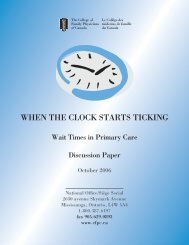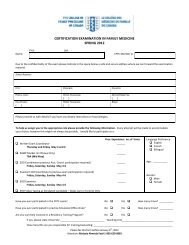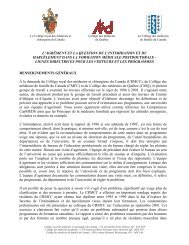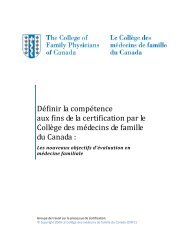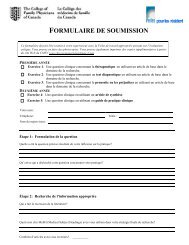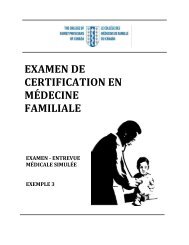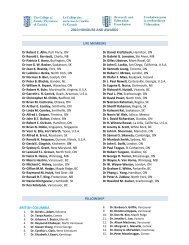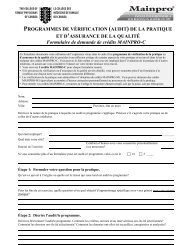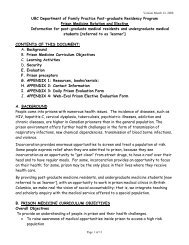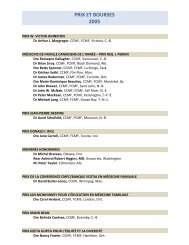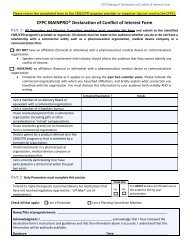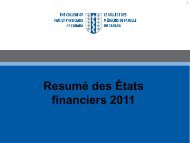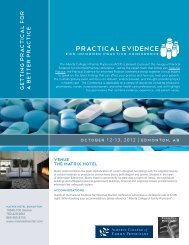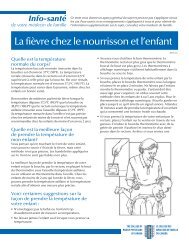Kopelow, M., Regnier, K. - Performance ... - Royal College
Kopelow, M., Regnier, K. - Performance ... - Royal College
Kopelow, M., Regnier, K. - Performance ... - Royal College
You also want an ePaper? Increase the reach of your titles
YUMPU automatically turns print PDFs into web optimized ePapers that Google loves.
CME in Supportof Improving <strong>Performance</strong>3 rd National CPDAccreditation Conference© 2008 ACCMEKate <strong>Regnier</strong>, MA, MBAACCME Deputy CEO and COO
Physician<strong>Performance</strong>ContinuingProfessionalDevelopmentAnalysisSynthesisJudgment© 2008 ACCME<strong>Regnier</strong> et al, JCEHP, 2005
Optimalwhat can be...Currentwhat is...Clinical PracticeExecutive PracticeResearch PracticeEducation Practice© 2008 ACCME
Terminology…• Change of performance = modifying what aperson does in practice• <strong>Performance</strong> measurement = what a persondoes in practice as compared to standards• <strong>Performance</strong> measures = standards that areset against which performance of a personcan be measured• ACCME Criteria = CME designed to changeand evaluated for change in competence,performance or patient outcomes• AMA PI CME TM = defined “activity format”with three stages© 2008 ACCME
Types of Measures…‣ Process MeasuresShow whether steps proven to benefit patients are followedcorrectly.‣ Outcomes MeasuresStudy actual results of care, not processes.‣ Patient Experience MeasuresRecord patients’ perspectives on their care.‣ Structural MeasuresReflect the conditions in which providers care for patients.‣ Composite MeasuresCombine the result of multiple performance measures toprovide a more comprehensive picture of quality care.© 2008 ACCMEhttp://www.qualityforum.org/Measuring_<strong>Performance</strong>/ABCs/The_Right_Tools_for_the_Job.aspx
http://www.qualityforum.org/Measures _List.aspx
http://www.ama-assn.org/apps/listserv/x-check/qmeasure.cgi?submit=PCPI
What is the problem we want to address?(and how are my learners involved?)Why does the problem exist?What do we want to change?Were we effective in producing change?Is the problem solved? If not, start again.© 2008 ACCME
Ability to Change…Factors affectingchange…• Administration• Professionalenvironment• Educationalenvironment• Public pressure• Economic incentivesEve et al,J Management in Medicine10(1)16-25 1996Change in practicealso dependent onsocial and culturalforces• Group norms• Professionalregulation• Environment factors( location, demographicssetting)Oxman et alCMAJ, 153, 1423, 1995© 2008 ACCME
Change Agent…Engagement as a Strategic Asset• Integrated into improvingprofessional practice• Adjuncts – ex. Reminders,patient feedback• Factors outside the CMEprovider• Addresses Barriers toPhysician Change• Collaborates andCooperates• Participates inframework for QualityImprovement• Positioned to influencethe scope and content ofCME(Criteria 16 through 22)© 2008 ACCME
2010 and beyond…What Quality CME is in 2010 and Beyond• Matches scope of practice• Addresses professional practice gaps• Evaluated in terms of change• In the context of a competency• Evidence based: Format appropriate to changedesired• Evidence based: Clinical recommendations contentvalid• Issues of conflict of interest and independenceaddressed.© 2008 ACCME
How to measure?• Ask your learners what they did (ordid not do).• Review charts or other descriptors ofperformance.• Use reimbursement data.• Use claims/risk management data.• Use institutional data.© 2008 ACCME
Case work: Design an activityto change the performanceof your learner(s)© 2008 ACCME
ABMS MOC ProcessPart I - ProfessionalStandingMedical specialists must hold avalid, unrestricted medicallicense in at least one state orjurisdiction in the United States,its territories or Canada.Part II - Lifelong Learningand Self-AssessmentPhysicians participate ineducational and selfassessmentprograms that meetspecialty-specific standards thatare set by their member board.Part III - CognitiveExpertise They demonstrate,through formalized examination,that they have the fundamental,practice-related and practiceenvironment-related knowledge toprovide quality care in theirspecialty.Part IV - Practice<strong>Performance</strong> AssessmentThey are evaluated in theirclinical practice according tospecialty-specific standards forpatient care. They are asked todemonstrate that they can assessthe quality of care they provide© 2008 ACCME
FSMB MOL TM ProcessProfessional development and Lifelong learningReflective Self Assessment(What improvements can I make?)Physicians must participate in an ongoing process ofreflective self-evaluation, self-assessment and practiceassessment, with subsequent successful completion ofappropriate educational or improvement activities.Assessment of Knowledge andSkills(What do I need to know and beable to do?)Physicians must demonstrate the knowledge, skills andabilities necessary to provide safe, effective patient carewithin the framework of the six general competencies asthey apply to their individual practice.<strong>Performance</strong> in Practice(How am I doing?)Physicians must demonstrate accountability forperformance in their practice using a variety of methodsthat incorporate reference data to assess theirperformance in practice and guide improvement.© 2008 ACCME
CME’s translation…What improvementscan I make?What do I need toknow and be able todo?How am I doing?1. What is the practice“issue” we want toaddress?2. Why does the “issue”exist?3. What do we want tochange?4. How do we want toeffect the change ?Were we effective inproducing change?If not, try again?© 2008 ACCME
Ongoing Professional PracticeEvaluation (OPPE)“ The intent…is that organizations arelooking at data on performance for allpractitioners with privileges on anongoing basis…to allow them to takesteps to improve performance on a moretimely basis.”- Joint Commission FAQ© 2008 ACCMEhttp://www.jointcommission.org/AccreditationPrograms/Hospitals/Standards/09_FAQs/MS/Ongoing_Professional_Practice_Evaluation.htm
AMA PI-CME TMAMA PI-CME is a certified CME activity in which an accredited CMEprovider structures a long-term three-stage process by which aphysician or group of physicians learn about specific performancemeasures, assess their practice using the selected performancemeasures, implement interventions to improve performance related tothese measures over a useful interval of time, and then reassess theirpractice using the same performance measures. A PI CME activity mayaddress any facet (structure, process or outcome) of a physician’spractice with direct implications for patient care.Stage A: Learning from current practice performance assessmentStage B: Learning from the application of PI to patient careStage C: Learning from the evaluation of the PI CME effort© 2008 ACCMEhttp://www.ama-assn.org/resources/doc/cme/pra-booklet.pdf
DiscussionSuggestionsStrategies© 2008 ACCME



